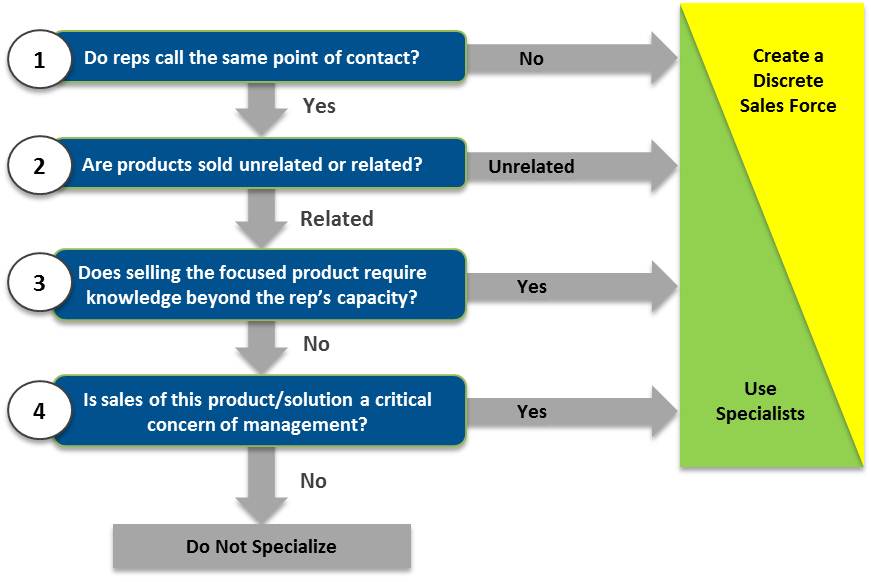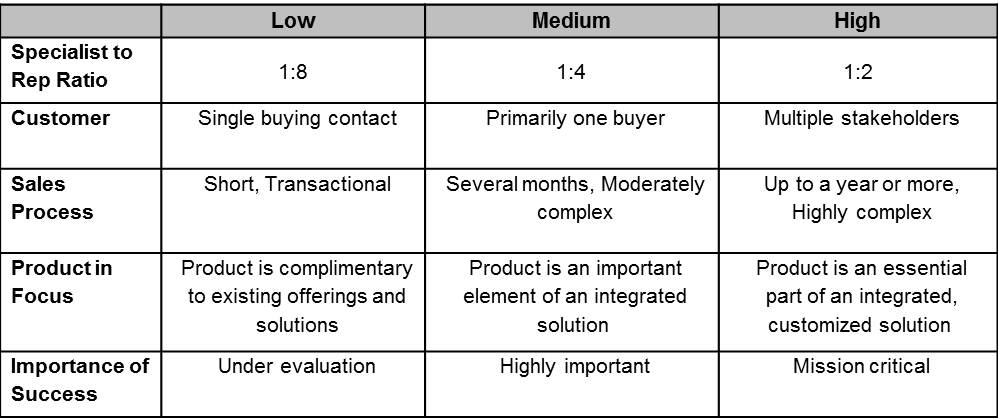When Should You Deploy Sales Specialists?
Sales leaders deploy sales specialists to team with their front-line reps to drive additional focus on certain products or solutions – typically newer, more complex and more profitable products or solutions. After all, the average sales rep spends a paltry 3% of sales time each week selling the “new product.” This is a disconcerting statistic when the sales leader relies on new product sales in order to hit plan. Many sales specialists are the result of acquisitions. When a company makes a strategic acquisition to obtain new technology, it may convert the acquired sales force into a sales overlay team supporting the core sales team.
But say the word “overlay” and the controversy begins. Finance can’t live with them. Sales seemingly can’t live without them. When do you need them, and for how long? What is the right number? Deploy too many and you’ll get buried by double crediting sales compensation. Have too few and you run the risk of not enough focus on the new, high margin product, leaving good opportunities overlooked and money on the table.
Understand first that this question begins with job design. Every well-designed sales role has bandwidth constraints defined by three factors: 1) the type of customer called on, 2) the nature of the sales process, and 3) the products and services sold. Sales specialists play an important role in situations where teaming is required to bring the necessary strength of knowledge and support to the sale. There are many aspects to a successful a sales structure, including sales capacity planning and organizational design. When deployed correctly, sales specialists can more than pay for themselves. The trouble is, sales leaders are often in a quandary on how to do it right.
When to Use Them.
Here is a simple decision tree to use when considering deploying sales specialists. Notice how the first three questions map to the three job design factors of customer, process and product. The last question gauges the criticality of the business goals for the product in focus. Notice also that specialists are designed to team with your existing sales force, hence the word “overlay.” However under certain circumstances you are best off deploying a separate or “discrete” sales force. This is generally true when selling unrelated products to a different buyer, or when there is no obvious benefit gained by selling them together.
Notice also that specialists are designed to team with your existing sales force, hence the word “overlay.” However under certain circumstances you are best off deploying a separate or “discrete” sales force. This is generally true when selling unrelated products to a different buyer, or when there is no obvious benefit gained by selling them together.
Generally speaking sales specialists should be deployed temporarily. Their goal should be to “work themselves out of a job” by training both the sales force and customers on the new offerings. The lifespan of a sales specialist can be as short as six months and as long as five years. Some specialists might stay on far longer if they continue to evolve, shifting their focus over time to newer products.
How Many Do You Need?
The right number to deploy depends on the complexity of the sale and the nature of their role. Here is a simple guide to consider when determining the ratio of specialists to your front-line sales reps: Realize that these are simply guidelines. The answer for your organization may vary based several factors including product maturity, sales force experience levels and competitive landscape, among others. We’ve observed ratios as low as 1:20 and as high as 1:1. An inside-based (phone and web only) sales specialist can effectively support more field reps. Practically speaking a field-based sales specialist will struggle to adequately support more than eight sales reps. The average sales deployment ratio is 1:4. Scenarios with 1:1 are rare and short lived, usually the result of two sales forces merged but not fully integrated.
Realize that these are simply guidelines. The answer for your organization may vary based several factors including product maturity, sales force experience levels and competitive landscape, among others. We’ve observed ratios as low as 1:20 and as high as 1:1. An inside-based (phone and web only) sales specialist can effectively support more field reps. Practically speaking a field-based sales specialist will struggle to adequately support more than eight sales reps. The average sales deployment ratio is 1:4. Scenarios with 1:1 are rare and short lived, usually the result of two sales forces merged but not fully integrated.
Once you determine the number and type of sales specialists needed you have to wrestle with another important question – how do you compensate them? We’ll take up the important topic of sales crediting and compensation for overlay positions in our next blog post. Stay tuned!
Learn more about Alexander Group’s services.

Need More Information?
For more information on deploying sales specialists, please contact us to speak with an expert.
